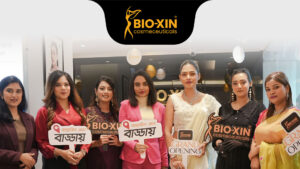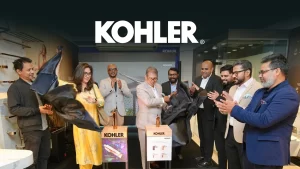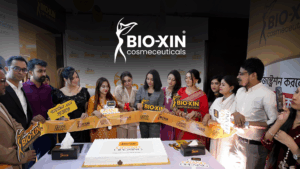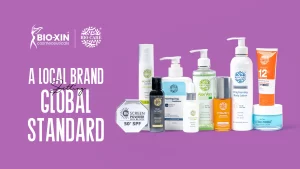Q. Give a glimpse into your early life and academic journey.
Speaking of my academic life, I completed my BBA with a marketing major and minor in Studio Art from Richmond American International University in London in 2002. After returning to Bangladesh, I got married and decided to give my undivided attention to my family. I started working in 2007 as the executive director of “Bengal Music” and worked with various artists in the industry and produced many albums under the label. After working for four years in the music industry, I headed ICE Media Limited, a publication wing of Bengal Group. I was responsible for “ICE Today” and launched The ICE Business Times magazine during my time there. After 2 years of working in the print media, I decided to explore the art space. Gradually we launched Bengal Art Lounge, and I began working with Bengal Foundation. I am still a director of ICE Media and a trustee of the Bengal Foundation, I believe my hands-on experience in some of these initiatives lead me to find my passion.
My interest in fashion initially began during my time at Bengal Music. Working with Bengal Music, I had the opportunity to work with many creative minds, which inspired me to explore my passions for art and fashion. I started experimenting with fabrics, particularly Jamdani. It was around 2009 when I was confident with the outcome and that is when I launched my fashion brand “Paera” and started hosting exhibitions and selling my designs.
My journey with Aranya started back in 2014, by then I realized that I want to work in the craft sector and connect it with Fashion. I did not want to blend the style of Paera and Aranya, so under Ruby Guzhnabi’s mentorship, I began to learn the skills and processes of Natural dying. When I took on the role of Managing and Creative Director of Aranya in 2015, I went on to rebrand and establish the label as a Premium Brand and worked toward systemizing its supply chain. My work toward creating a green value chain led me to become an Acumen Fellow. My journey as a designer led me to participate in fashion projects, and workshops with the School of Art and Design Berlin-Weissensee, London College of Fashion, Parsons School of Design, and Coventry University in the UK. I have gained extensive knowledge about natural dye processes from world-renowned dye practitioners such as Ruby Ghuznabi and Abu Bakar Fafuna from West Africa. I am also a recipient of several Awards of Excellence from the World Craft Council and UNESCO for my designs.

Q. Give us an overview of Aranya and the environmental and sustainable aspects it promotes in the fashion industry.
Aranya was established in 1990 and from its inception, we intended to create a brand that measures people, the planet, and profit equally. The world today is telling us to exactly apply such a concept of sustainability where designing, manufacturing, logistics, retailing, consuming, and disposal of products have the consideration of environmental, social, and economic impacts.
Aranya’s main objective was to revive the practice of natural dye, conservation of traditional craft forms, work with eco-friendly biodegradable materials and empower local artisans. For the past 3 decades, that’s exactly what we continued to do through various partnerships and projects, and have been putting our profits back into the communities. Our goal was to maintain a low carbon footprint production process for handloom and toxic-free dye processing for the textiles. In design thinking, we adapted to recycling waste and upcycling rejected textiles and using waste materials for dyestuff. As a Fair Trade enterprise, we worked towards implementing the 10 principles within our business ecosystem. With the help of the World Fair Trade Organisation and the World Craft Council, we managed to popularise our traditional crafts in the world’s Market. Our conscious customers have been a constant support throughout our journey.
Being a part of the Fashion Revolution helped me further to understand the implication of Fashion and its negative impacts. We have a strong global network that constantly works in collaboration and exchanging knowledge. We often meet innovators, designers, and educators working toward change. The word sustainability is more complex now than ever. Fashion unfortunately involves a high environmental and social cost. While the impacts of the fashion industry in terms of pollution, water use, carbon emissions, human rights, and gender inequality are increasing, the need for sustainable fashion is very evident.
I believe Aranya has much more responsibilities now than ever to safeguard craft-based artisanal work which is under threat due to rapid industrialization. Having said that, we can also take advantage of today’s tools and knowledge to further improve our environmental footprint and the lives of the communities we work with to achieve greater transparency and accountability. This is something I hope to work on in the coming years as well. I am currently doing an MBA in sustainable Fashion Management and working towards improving Aranya’s business model. My vision is to produce Slow Fashion and reinforce a green value chain that offers better livelihood programs for marginalized women and artisans.
Q. Do you have any expansion plans with Aranya?
Considering my experience throughout the years, I find Aranya in a unique position to accelerate. Sustainable fashion is a process of change, and Aranya is not perfect. It is in constant need of resources. To achieve greater ecological integrity and social justice, we often need to take a systemic thinking approach that involves different stakeholders, which means it takes us a long time to achieve our goals.
Amidst covid, much of Aranya’s work seemed to be lost. Currently, our focus is on rebuilding our fragile system, but this time with the hindsight of what it needs to address to avoid another catastrophe. We aim to build back a better ecosystem. I am positive that with the help of collaborations and partnerships we can systemize Aranya’s informal channels. I also believe Aranya is blessed to have loyal customers at home and abroad who believe in the Fair Trade label. We have two bricks and a mortar and are exporting to several countries already. Our future expansion plan will revolve around our core values to promote slow fashion, empowerment of local craftsmen and women, fostering partnerships, and the promotion of Bangladeshi artisanal products worldwide.

Q. Who inspired you to become the person you are today?
My father is the biggest inspiration for me to thrive, even though he hardly realized it at first. During my days in academia, it was a told norm that men are the ones who will take future leadership positions. But during my childhood, my father used to tell us about his dreams and success stories, and it fascinated me as much as it inspired my brothers. The work he does helps me understand what sort of person I want to be. Even though it took me a while to find my passion, I now believe my tenacity to break norms and go against gender bias and achieve every goal despite the obstacles, was something inevitable. Looking at my father, I found the inspiration to fight against the odds and establish myself where I am today.
Q. What are your opinion regarding women emerging as leaders in recent years?
I am optimistic that the future of women entrepreneurs is bright in our country. I have seen a generation of women being empowered within the past few years. Our patriarchal system is slowly understanding the worth of women and that it is advantageous to have women in a leadership positions may it be as professionals, entrepreneurs, or humanitarians. Many amazing initiatives are also trying to assist in supporting women in leadership. I have been a beneficiary of many such platforms. Working closely with rural women, I know how strong and driven they are. It is the right thing to capitalize on it. I believe we can succeed in achieving gender equality if girls are empowered from their formative years. I believe when girls and boys are taught they are equal from an early age that is when we can break free from gender bias.
Q. Tell us about the goals you want to achieve through Aranya and where you want to see yourself in the coming years.
As we have already established ourselves as a sustainable brand, we aim to keep the momentum further by becoming compliant and aligning an environment-friendly approach in every strand of our work. We want to restructure our supply chain in such a way that it remains an example of how a clothing brand can be operated keeping the environment as its primary focus. Furthermore, we want to strengthen our stand in the global market as well. I believe that integrating corporate social responsibility in Aranya’s business model will be the fundamental step in driving any success in the future. Aranya will measure success by implementing a design philosophy that drives us towards environmental and social sustainability, creating a system that can foster positive human impact on the environment and drive social responsibility.






